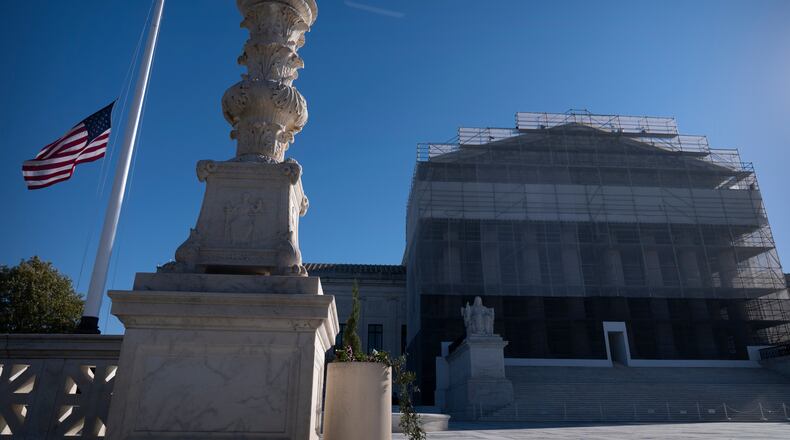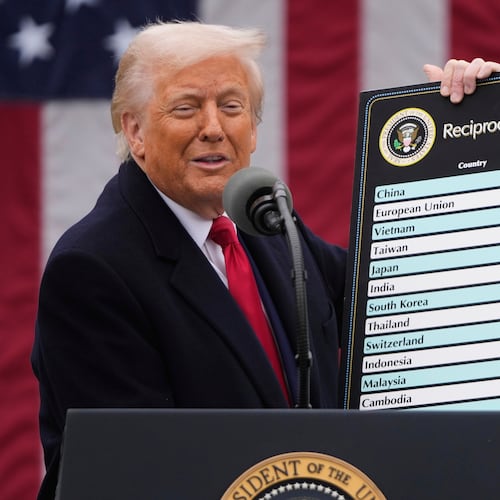WASHINGTON (AP) — A majority of Supreme Court justices seemed skeptical on Wednesday about President Donald Trump ’s ability to unilaterally impose far-reaching tariffs, putting at risk a cornerstone of his agenda in the biggest legal test yet of his unprecedented presidency.
Three conservative justices raised questions about whether an emergency law gives Trump near-limitless power to set and change duties on imports, with potentially trillion-dollar implications for the global economy.
The court’s three liberal justices also appeared dubious, so at least two conservative votes could limit Trump’s tariff power, though likely not end it altogether.
The case is the first major piece of Trump’s agenda to come squarely before the nation’s highest court, which he helped shape by naming three of the nine justices in his first term.
The conservative majority has so far been reluctant to check his extraordinary flex of executive power in short-term orders in cases ranging from presidential firings to funding cuts.
That could change with a more detailed ruling in the tariff case, though it will likely take weeks or months to come down.
The Constitution says Congress has the power to levy tariffs. But, in a first, the Trump administration argues that an emergency law allowing the president to regulate importation also includes tariffs.
Justice Neil Gorsuch, though, appeared concerned that could shift too much power to the president on an issue that helped spark the American Revolution.
“Is the constitutional assignment of the taxing power to Congress, the power to reach into the pockets of the American people, just different?” he asked. “That had to be done locally, through our elected representatives.”
Justice Amy Coney Barrett and Chief Justice John Roberts also raised questions about whether the emergency-power law allowed for tariffs on “any product, from any country, in any amount, for any length of time,” as Roberts put it.
“The basis for the claim seems to be a misfit,” he said.
Trump has called the case one of the most important in the country’s history and said a ruling against him would be catastrophic for the economy.
The challengers argue the 1977 emergency powers law Trump used doesn’t even mention tariffs, and no president before has used it to impose them. A collection of small businesses say the uncertainty is driving them to the brink of bankruptcy.
The case centers on two sets of tariffs. The first came in February on imports from Canada, China and Mexico after Trump declared a national emergency over drug trafficking. The second involves the sweeping “reciprocal” tariffs on most countries that Trump announced in April.
Multiple lawsuits have been filed over the tariffs, including a case from a dozen largely Democratic-leaning states and another from small businesses focused on everything from plumbing supplies to women's cycling apparel.
Lower courts have agreed that the tariffs were an illegal use of emergency power.
The Supreme Court has been skeptical of executive power claims before, such as when then-President Joe Biden tried to forgive $400 billion in student loans under a different law dealing with national emergencies. The Supreme Court found the law didn’t clearly give him the power to enact a program with such a big economic impact, a legal principle known as the major questions doctrine.
The challengers say Trump’s tariffs should get the same treatment, since they’ll have a much greater economic effect, raising some $3 trillion over the next decade. The government, on the other hand, says the tariffs are different because they’re a major part of his approach to foreign affairs, an area where the courts should not be second-guessing the president.
Justices like Brett Kavanaugh seemed receptive to that argument, and Roberts also seemed hesitant to restrict the president's foreign affairs power.
The challengers also tried to channel the conservative justices’ skepticism about whether the Constitution allows other parts of the government to use powers reserved for Congress, a concept known as the nondelegation doctrine. Trump’s interpretation of the law could mean anyone who can “regulate” can also impose taxes, they say.
The Justice Department counters that legal principle is for governmental agencies, not for the president.
If he eventually loses at the high court, Trump could impose tariffs under other laws, but those have more limitations on the speed and severity with which he could act. The aftermath of a ruling against him also could be complicated, if the government must issue refunds. So far, the Treasury has collected almost $90 billion from the import taxes the president has imposed under the emergency powers law.
The Trump administration did win over four appeals court judges who found the 1977 International Emergency Economic Powers Act, or IEEPA, gives the president authority to regulate importation during emergencies without explicit limitations. In recent decades, Congress has ceded some tariff authority to the president, and Trump has made the most of the power vacuum.
___
Follow the AP's coverage of the U.S. Supreme Court at https://apnews.com/hub/us-supreme-court.
Keep Reading
The Latest
Featured


